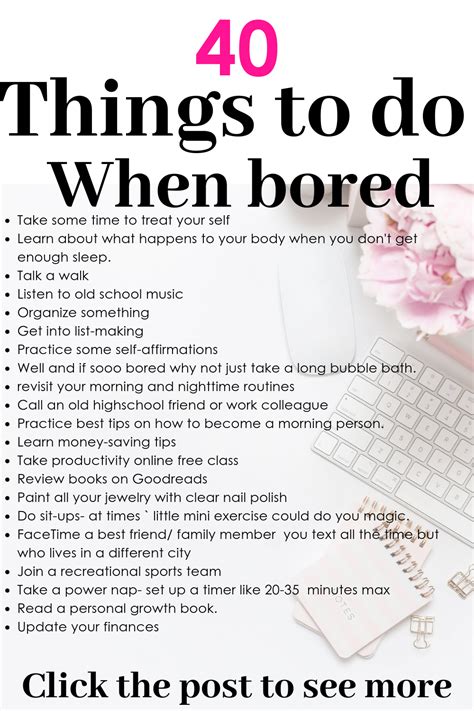16 Productive Things To Do When Bored At Work

Feeling bored at work can be frustrating and demotivating. However, instead of letting the boredom consume you, why not use that time to be productive? There are many things you can do to make the most of your downtime and improve your skills or work environment. In this article, we will explore 16 productive things you can do when bored at work.
1. Organize Your Workspace
A cluttered workspace can hinder your productivity and increase stress levels. Take some time to declutter and organize your desk, drawers, and computer files. This will not only make your workspace more visually appealing but also help you find things more easily.
2. Update Your To-Do List
Review and update your to-do list. Prioritize your tasks and add any new ones that may have come up. Having a clear plan of what needs to be done will help you stay focused and productive throughout the day.
3. Learn Something New
Use your downtime to expand your knowledge and skills. Take an online course, read industry-related articles or books, or listen to educational podcasts. Learning something new can not only make you more valuable in your current role but also open up new opportunities for growth.
4. Connect with Colleagues
Building strong relationships with your colleagues is essential for a positive work environment. Take this opportunity to reach out to your coworkers and engage in meaningful conversations. This can help foster teamwork and collaboration.
Example:
For instance, you can schedule a coffee break with John from the marketing team and discuss the latest marketing trends. Sharing knowledge and experiences can be mutually beneficial and help you broaden your perspective.
5. Set Personal Goals
Use your downtime to reflect on your personal goals and aspirations. Write them down and create an action plan to achieve them. Setting personal goals can give you a sense of purpose and motivation in your work.
6. Improve Your Skills
Identify areas where you can improve your skills and dedicate some time to work on them. This could be learning a new software, improving your communication skills, or enhancing your presentation abilities. Developing your skills can make you more efficient and valuable in your job.
7. Research Industry Trends
Stay up-to-date with the latest trends and developments in your industry. Read industry blogs, subscribe to newsletters, and follow industry influencers on social media. Being aware of industry trends can help you anticipate changes and stay ahead of the competition.
8. Volunteer for Extra Projects
If you find yourself with extra time on your hands, consider volunteering for additional projects or tasks. This not only helps you stay productive but also shows your initiative and willingness to take on more responsibilities.
9. Streamline Your Processes
Take a step back and evaluate your work processes. Look for ways to streamline and automate repetitive tasks. This can save you time and make your work more efficient.
10. Take Breaks
While it may seem counterintuitive, taking regular breaks can actually improve your productivity. Use your downtime to recharge by taking short walks, stretching, or practicing mindfulness exercises. This can help clear your mind and increase focus.
11. Network
Networking is crucial for professional growth. Use your downtime to attend industry events, join professional organizations, or connect with like-minded professionals on LinkedIn. Building a strong professional network can open doors to new opportunities and collaborations.
12. Review and Update Your Resume
Take this time to review and update your resume. Highlight any new skills, achievements, or certifications you have acquired. A well-crafted resume can help you stand out when applying for new opportunities.
13. Brainstorm Ideas
Let your creativity flow by brainstorming new ideas or solutions to existing problems. Use this time to think outside the box and come up with innovative approaches. Write down your ideas and share them with your team or supervisor.
14. Plan Your Next Vacation
Use your downtime to plan your next vacation. Research destinations, create itineraries, and set a budget. Having something to look forward to can boost your mood and motivation.
15. Practice Time Management
Use your downtime to analyze how you manage your time. Identify any time-wasting activities or habits and find ways to eliminate or minimize them. Practicing effective time management can help you become more productive and achieve better work-life balance.
16. Reflect and Set Goals for the Future
Take some time to reflect on your past achievements and challenges. Use this reflection to set goals for the future. Visualize where you want to be in your career and create a plan to get there. Setting long-term goals can provide you with direction and motivation.
Conclusion
Boredom at work can be turned into an opportunity for personal and professional growth. By taking proactive steps and engaging in productive activities, you can make the most of your downtime and improve your skills and work environment. Use the suggestions provided in this article to stay motivated and make every moment count.
FAQs
1. How can organizing my workspace improve productivity?
Organizing your workspace can improve productivity by reducing distractions, making it easier to find necessary items, and creating a visually appealing environment that promotes focus and clarity.
2. Why is learning something new important?
Learning something new is important because it keeps your mind sharp, enhances your skills, and opens up new opportunities for personal and professional growth. It can also make you more adaptable in an ever-changing work environment.
3. How can networking benefit my career?
Networking can benefit your career by providing access to new job opportunities, industry insights, mentorship, and potential collaborations. Building a strong professional network can help you expand your knowledge and reach within your field.
4. How does practicing time management improve productivity?
Practicing time management improves productivity by helping you prioritize tasks, allocate time effectively, and minimize time-wasting activities. It allows you to focus on the most important tasks and achieve better work-life balance.
